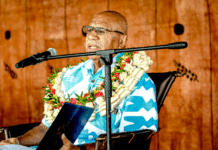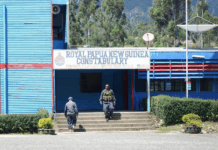
All mask wearing requirements in Aotearoa New Zealand — except in healthcare and aged care — will be scrapped, and household contacts will no longer need to isolate, the government confirmed today.
Prime Minister Jacinda Ardern and Minister for Covid-19 Response Dr Ayesha Verrall confirmed cabinet’s decision to scrap the Covid-19 Protection Framework — known as the “traffic light” system — and the majority of related public health restrictions.
The traffic light system will end tonight at 11.59pm.
- READ MORE: Other reports about NZ and the pandemic
- Covid-19 traffic light system, vaccine mandates and most mask requirements to end – the details
- Covid-19 update: 1149 new community cases, 225 hospitalisations and three in ICU
- Today’s covid health statistics
Today’s media briefing. Video: RNZ News
They said the changes would include:
- Mask-wearing only required in healthcare and aged care: including hospitals, pharmacies, primary care, aged residential and disability-related residential care
- People who test positive for covid-19 must still isolate for seven days, but household contacts no longer required to provided they take a RAT test every day
- All government vaccine mandates to end on 26 September 26
- Removal of all vaccine requirements for incoming travellers and air crew
- Leave support payments to continue
- All New Zealanders over age 65, and Māori over age 50, to get automatic access to covid-19 antiviral drugs if they test positive for Covid-19
- From Tuesday, case and hospitalisation number reporting becomes weekly, not daily
Ardern said it marked a milestone in New Zealand’s response to the virus.
She said people may still be asked to wear a mask in some places but it would be at the discretion of those managing the location, not a government requirement. Vaccination requirements would also be at the discretion of employers.
‘Claim back certainty’
“Cabinet has determined that based on public health advice we are able to remove the traffic light system and with that decision claim back the certainty we have all lost over the last three years,” she said.
“For the first time in two years we can approach summer with the much needed certainty New Zealanders and business need, helping to drive greater economic activity critical to our economic recovery.
She said there was no question the actions of New Zealanders had saved thousands of lives, but the risks were changing.
“When we moved into our first lockdown the objective was simple: To save lives and livelihoods,” Ardern said.
“I’m sure there will be many who over the years will pore over the details of every nation’s response including ours. They’ll certainly measure the outcomes in different ways but when you look at countries of our size and compare them, they’ll find the tragic loss for instance of 15,500 people in Scotland and less than 2000 in New Zealand.
“The most recent health advice now tells us that with the lowest cases and hospitalisations since February, our population well vaccinated, and expanded access to anti-viral medicines, New Zealand is in a position to move forward.”
New Zealand could move on with confidence that its actions had successfully managed cases down, she said.
‘Never to be taken alone’
“This pandemic was never one to be taken on alone, and it never was. And so today I say again to everyone from the bottom of my heart, thank you.
“I know there will be those concerned by the changes made today. I can assure you that we would not make them if we did not believe we were ready but we also need to remember that not everybody experiences covid or its risk — including to our disability community — in the same way.
“That’s why isolating covid cases to protect our most vulnerable is important, and why treatment is too.”
She said she hoped it would be the first summer where the “covid-19 anxiety can start to heal”.
“As a nation, covid has hurt us in many ways but perhaps the one we talk about less than others is the toll it’s taken on everyone’s mental health. I see that toll — I see it in my colleagues, in my community in Tāmaki Makaurau, and especially I see it in our kids.
“I don’t want people’s wellbeing to be the price of covid, but it is going to take a concerted effort from us as government and others for that not to be the case.”
Ardern said one of the byproducts of the pandemic had been that New Zealand now have some of the most advanced mental health tools in the world, and the government had taken a number of steps to improve mental wellbeing support.
Two apps a highlight
This included two apps she highlighted for anyone who may need them: Groove and Habits.
Ardern finished her statement with a line from when New Zealand first went into lockdown: “‘For the next wee while, things will look worse before they look better’. It turned out to be true, things did get worse, things did get hard, but it’s also true that finally they will and can be better”.
Ardern said looking back, decisions were often being made with imperfect information but the decisions were made with the best intentions and she stood by it.
She said the government had been open to the idea of an independent inquiry into the response but was still getting advice about what that would look like.
“We do want to learn from this period and I think you’ll see that we’ve been taking that approach all the way through.”
Asked if it was the end of the covid response, Ardern said she hoped the change would give people huge confidence and optimism.
“We are moving on because this pandemic has moved on.”
The traffic light system used things like gathering limits but that was no longer fit for purpose, she said.
“We don’t need those extraordinary measures, so we won’t use them.”
Right time to remove ‘traffic lights’
Dr Verrall said New Zealand had succeeded in avoiding the devastation caused by the pandemic overseas, and now was the right time to remove the traffic light framework and begin a new approach to managing the virus.
“Together we have got through this with one of the lowest cumulative mortality rates in the world.”
She announced another 40,000 courses of antiviral medication had also been purchased and would be freely available to older New Zealanders.
“Anyone over the age of 65, and Māori and Pacific people over the age of 50, or anyone who meets Pharmac requirements, can access the treatment in the early stages of contracting the virus,” she said.
“This means more than double the number of New Zealanders will be able to access these medicines if they need them than previously.
She acknowledged that lessening the restrictions caused concern to disabled and immune-compromised people.
“I want to reassure those Kiwis that we are making these changes because risks are lower, in fact cases are more than 10 times lower than what they were earlier in the year and we now have layers of protections in place.”
She said the support was not ending and hoped that removing the remaining vaccine mandates would ease the staffing pressures disability services have been under.
This article is republished under a community partnership agreement with RNZ.
















































